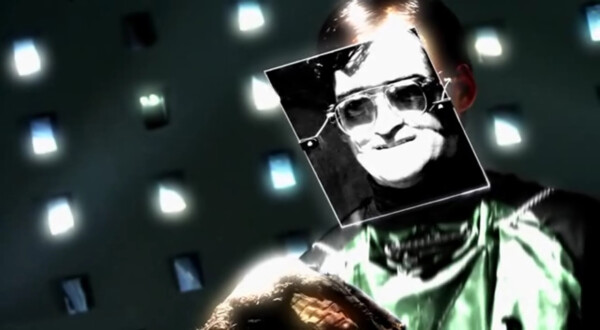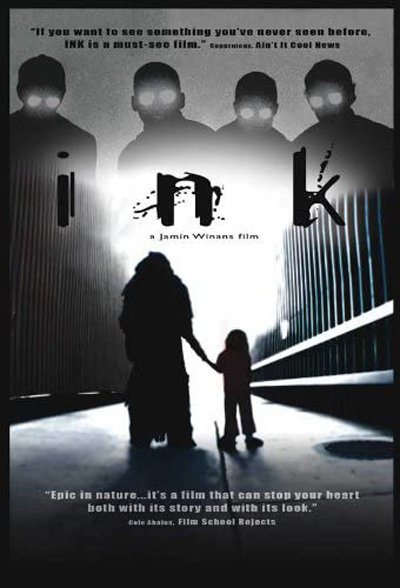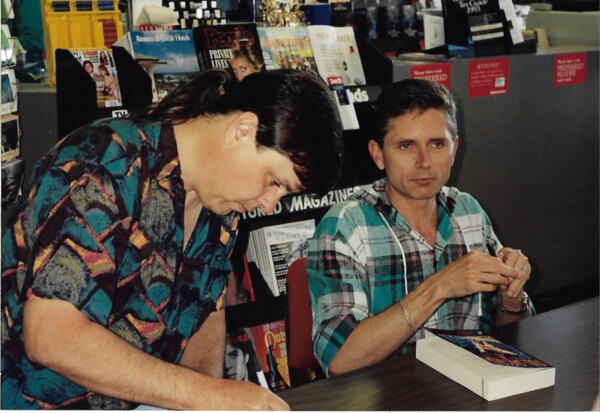Mladen and Del review ‘Ink’

Image courtesy of Double Edge Films.
“Ink.” Starring Christopher Soren Kelly, Quinn Hunchar, Jessica Duffy, Jennifer Batter, and others. Directed by Jamin Winans. 107 minutes. Not rated. Amazon Prime
Mladen’s take
My boss recommended that I watch “Infinity Chamber.” I did and liked the film enough to see what other movies starred Christopher Soren Kelly, the computer hacker and insurrectionist in “Infinity Chamber.” The film “Ink” popped up. It was accompanied by an interesting summary, so I watched it. I did not regret my decision and Del better not either.
He and I take turns choosing which movies to review. While Del often picks losers, I seldom do. “Ink” is no exception to my sterling track record, but Del may disagree, albeit ineffectively.
“Ink” is a parable about right and wrong. The film tackles the notion of ambition and the way it can not only destroy those who are stepped on, but those who do the stepping. Trump should watch the movie. “Ink” explains in a Brothers Grimm sort of way why he’s so fucked now that he’s no longer occupying the White House. U.S. senators Tumbleweed Cruz, Rabid Rand, Lilting Lindsey, Himmler Hawley, and Murine McConnell, to name a few, would also benefit from watching the movie. In the end, “Ink” shows the way to redemption, which those boys will need badly before it comes time for them to meet their Maker.
Kelly plays two characters in “Ink,” terrible husband John, who’s even worse as a father, and Ink, a junior partner to the Grim Reaper. Toss in the supernatural kidnapping of John’s daughter Emma, portrayed very nicely by then-young Quinn Hunchar, by Ink; a group of fairy-like do-gooders trying to rescue Emma from Ink; and some very interesting others who side either with goodness or badness as this other earthly story unfolds, and you have a movie that reaches A-.
I was charmed by the film’s low-budget special effects, though using electrical tape to make X’s across the life rhythm keeper’s eyes annoyed me. It’s the life rhythm keeper, however, who is central to one of the film’s neatest pieces. He initiates an event that causes a chain reaction of incidents that result in John helping his daughter recover from her Ink-induced exposure to the dastardlier aspect of Dreamworld, the cabal of Incubi. The way the Incubi are depicted, by the way, is cool and psychedelic. It reminded me of the scenes in “Brazil” where the servants of the totalitarian state use information processing equipment fitted with magnifying glasses to read material used to destroy lives. Or were magnifying screens part of the setting of the movie version of “1984”?
It took me a moment to adapt to the way “Ink” works. But, I’m not particularly bright and Del less so. It may be easier for you to orient yourself. Be patient for the first, oh, 15 minutes of the film. By then you should be fully immersed in the realm the movie creates. Keep in mind that this movie must have had a small budget. It relies on drab urban landscapes, inner-city plots, and industrial workspaces to convey its fantastical world. I can’t recall the soundtrack, which is OK.
“Ink” is Aesop-like storytelling that serves as its own unadorned tool for teaching us all a lesson.

Del’s take
Oh yes, Mladen’s taste in movies is impeccable. He recommended “Bone Tomahawk” and I’m still in therapy. But with “Ink” he proved the old adage that if you give a monkey a typewriter, one day it’ll type Shakespeare. “Ink” is one of his rare winning suggestions.
I too was charmed by the movie, which is, as Mladen accidentally stumbled upon, a modern parable. And I agree that you need to give the movie a chance. Stick with it and you’ll be rewarded with explanations about Storytellers, Incubi and Pathfinders, all denizens of an alternate reality that rule supreme over your dreams.
“Ink” is one of those movies that requires attention, and yes, it operates on many different levels. But unlike “Tenet” it is not indecipherable. The keen eye will discern a very neat synchronicity bound in metaphors for good, evil, and more importantly, the loyalty and dedication borne of love.
The pacing is brisk but populated with moments of quiet introspection. But what impressed me most was the look of the film – gritty black and white and some very cool retro tech that reminded me of the John Wick films and Ridley Scott’s “Bladerunner.”
Hunchar is brilliant as Emma, the little girl whose soul is plucked from her body by the titular character Ink as he seeks entré to the world of the Incubi. Also brilliant is Jeremy Make as the blind Pathfinder Jacob (after falling – “Hello dirt. How are we today?”). Kelly is effective as the high-strung, hard-charging John / Ink, who spends the movie rediscovering his humanity.
Less impressive were the Storytellers, who seemed cut from the cloth of the ninja/warrior/apprentice template. They were there and they were honorable, and that was about it. Except Jessica Duffy as Liev, who sacrifices everything to save young Emma. Her character stepped out of the stereotype to make an impression.
“Ink” creates its own lexicon of morality and honor, and articulates those values in ways you likely have never seen. For an indie film it casts a long shadow, and I expect it will someday join the ranks of those quiet cult films beloved by fans of science fiction, horror and fantasy. You know the ones I’m talking about – “THX 1138,” “Code 46,” “Pumpkinhead” and “City of Ember,” all terrific little films nobody knows about but nonetheless advanced their genres.
I think “Ink” falls into the A- category. I don’t think it’s everyone’s cup of tea, but for those willing to do the work it’s a happy anecdote that will make that bottle of melatonin worth its weight in gold.
Mladen Rudman is a former journalist and technical writer. Del Stone Jr. is a former journalist and author.

Image by Mass Communication Specialist 1st Class Chad J. McNeeley
Sometimes working for a newspaper sucks. You don’t get to sit back and enjoy events like today’s inauguration. You’re too busy trying to come up with local angles, scrounging for art, installing live video feeds and coordinating with reporters in the field. Inaugurations, hurricanes, terrorist attacks – they’re occasions for work – massive amounts of work. Sometimes I think it would be nice to simply plant my increasingly ample backside on the couch and watch it all unfold on TV. Let somebody else worry about fresh copy, databases and high–resolution photos. But that would make me a bad journalist and I hope when it’s all said and done, I wasn’t a bad journalist.
Throughout the day I saw a gamut of reaction: proud black Americans celebrating the ascendancy of one of their own … proud white Americans declaring an end to racism … angry black Americans decrying the election of an “Uncle Tom” … angry white Americans dressed in black to mourn the death of America.
It’s all so stupid.
We need to get past this hangup about race – and that goes for whites and blacks. Racism, just like tolerance, is color blind. Plenty of racists to go around on both sides of the ethnicity fence. Until that stops nothing will really change.
What’s important is this: that Obama do a good job as president. This country has a lot of problems and while it’s fashionable to believe no one man can make a difference, that’s not true. Just look at what George W. Bush did in eight years.
I want Obama to restore America’s stature in the world. I’m tired of being berated as a warmonger and a voracious consumer of resources. I’d like to be able to dress like an American while traveling abroad and not worry about having my head blown off.
I want Obama to do something about the debt. America is owned by the Chinese, the British and Japan. The government has operated like a kid with Mom and Dad’s credit card for decades. It’s got to stop. Interest payments on the debt will eat up half the budget in the near future. Can’t do much good when you’re sending half your income to Visa and not even paying down the principal.
I want Obama to do everything he can short of socialism to encourage alternate energy development. The oil swill has got to stop. We’ve known that for decades. Oil is a finite resource and it’s causing irreparable environmental damage. Now is as good a time as any to work on its replacement.
I want the environment to be cleaner. I nearly choked on my TV dinner when I heard Bush tout his environmental record during his farewell address. Bush’s environmental record is the equivalent of an asteroid strike – it’ll take decades to undo the damage he’s done.
I want white collar workers to be held accountable for their crimes. I guy who sticks up a convenience store for a couple of hundred bucks does more jail time than a guy who steals millions from an investment firm. That’s just classism, pure and simple. It’s wrong.
I don’t care about rhetoric and speeches. I don’t care about a person’s race. I want quality leadership, which springs from intelligence, courage and integrity.
Is Obama all those things? I hope so. All the “Uncle Tom” haters or the people dressed in black should give the man a chance.
Notice I said “man.” Not black. Not Democrat.
Just man.
Let’s hope for the best.
About the author:
Del Stone Jr. is a professional fiction writer. He is known primarily for his work in the contemporary dark fiction field, but has also published science fiction and contemporary fantasy. Stone’s stories, poetry and scripts have appeared in publications such as Amazing Stories, Eldritch Tales, and Bantam-Spectra’s Full Spectrum. His short fiction has been published in The Year’s Best Horror Stories XXII; Alfred Hitchcock’s Mystery Magazine; the Pocket Books anthology More Phobias; the Barnes & Noble anthologies 100 Wicked Little Witch Stories, Horrors! 365 Scary Stories, and 100 Astounding Little Alien Stories; the HWA anthology Psychos; and other short fiction venues, like Blood Muse, Live Without a Net, Zombiesque and Sex Macabre. Stone’s comic book debut was in the Clive Barker series of books, Hellraiser, published by Marvel/Epic and reprinted in The Best of Hellraiser anthology. He has also published stories in Penthouse Comix, and worked with artist Dave Dorman on many projects, including the illustrated novella “Roadkill,” a short story for the Andrew Vachss anthology Underground from Dark Horse, an ashcan titled “December” for Hero Illustrated, and several of Dorman’s Wasted Lands novellas and comics, such as Rail from Image and “The Uninvited.” Stone’s novel, Dead Heat, won the 1996 International Horror Guild’s award for best first novel and was a runner-up for the Bram Stoker Award. Stone has also been a finalist for the IHG award for short fiction, the British Fantasy Award for best novella, and a semifinalist for the Nebula and Writers of the Future awards. His stories have appeared in anthologies that have won the Bram Stoker Award and the World Fantasy Award. Two of his works were optioned for film, the novella “Black Tide” and short story “Crisis Line.”
Stone recently retired after a 41-year career in journalism. He won numerous awards for his work, and in 1986 was named Florida’s best columnist in his circulation division by the Florida Society of Newspaper Editors. In 2001 he received an honorable mention from the National Lesbian and Gay Journalists Association for his essay “When Freedom of Speech Ends” and in 2003 he was voted Best of the Best in the category of columnists by Emerald Coast Magazine. He participated in book signings and awareness campaigns, and was a guest on local television and radio programs.
As an addendum, Stone is single, kills tomatoes and morning glories with ruthless efficiency, once tied the stem of a cocktail cherry in a knot with his tongue, and carries a permanent scar on his chest after having been shot with a paintball gun. He’s in his 60s as of this writing but doesn’t look a day over 94.
Contact Del at [email protected]. He is also on Facebook, twitter, Pinterest, tumblr, TikTok, and Instagram. Visit his website at delstonejr.com .

Yours truly (right) signs copies of "Full Spectrum 4" with Ray Aldridge (left) at a signing event at the Waldenbooks at Santa Rosa Mall in Mary Esther, Fla., in 1993. I don't know who took this photo.
I have been writing since the eighth grade. I began selling professionally in the mid–’90s and as recently as last year made the finals of the British Fantasy Award.
Around 2000 I began to wonder if there was any point in continuing. My sense was books were headed in the same direction as newspapers and magazines – marginalized by the web and video games and cell phones … and I guess the general illiteracy that seems to be overtaking the world.




I’ve dedicated a significant portion of my life to learning the use of words as an art form and lately I miss doing that. I suppose it has something to do with work, which has gone from providing an outlet for my creativity to confronting me with a relentless assembly line of button–pushing and software configuring.
But again, is there any point? I pose this question to the professional writers on my friends list who are still writing and, presumably, selling. Are there markets for novels? Do writers get paid for their work? Is the book an end or merely a means to an end, like a movie deal?
I would like to start writing again but I don’t want to do that if it means giving away my work or worse, having it lie fallow in my computer.
I know. That violates every tenet of the artist who is compelled to create regardless of markets and advances and licensing rights issues. Still, when I hear that Bantam Books has been shut down and mid–list writers are being muscled out of the business I wonder if my time wouldn’t be better spent at the local vocational–technical school learning a trade.
So … if you have any thoughts on the subject and would like to comment, I’d appreciate the input.
About the author:
Del Stone Jr. is a professional fiction writer. He is known primarily for his work in the contemporary dark fiction field, but has also published science fiction and contemporary fantasy. Stone’s stories, poetry and scripts have appeared in publications such as Amazing Stories, Eldritch Tales, and Bantam-Spectra’s Full Spectrum. His short fiction has been published in The Year’s Best Horror Stories XXII; Alfred Hitchcock’s Mystery Magazine; the Pocket Books anthology More Phobias; the Barnes & Noble anthologies 100 Wicked Little Witch Stories, Horrors! 365 Scary Stories, and 100 Astounding Little Alien Stories; the HWA anthology Psychos; and other short fiction venues, like Blood Muse, Live Without a Net, Zombiesque and Sex Macabre. Stone’s comic book debut was in the Clive Barker series of books, Hellraiser, published by Marvel/Epic and reprinted in The Best of Hellraiser anthology. He has also published stories in Penthouse Comix, and worked with artist Dave Dorman on many projects, including the illustrated novella “Roadkill,” a short story for the Andrew Vachss anthology Underground from Dark Horse, an ashcan titled “December” for Hero Illustrated, and several of Dorman’s Wasted Lands novellas and comics, such as Rail from Image and “The Uninvited.” Stone’s novel, Dead Heat, won the 1996 International Horror Guild’s award for best first novel and was a runner-up for the Bram Stoker Award. Stone has also been a finalist for the IHG award for short fiction, the British Fantasy Award for best novella, and a semifinalist for the Nebula and Writers of the Future awards. His stories have appeared in anthologies that have won the Bram Stoker Award and the World Fantasy Award. Two of his works were optioned for film, the novella “Black Tide” and short story “Crisis Line.”
Stone recently retired after a 41-year career in journalism. He won numerous awards for his work, and in 1986 was named Florida’s best columnist in his circulation division by the Florida Society of Newspaper Editors. In 2001 he received an honorable mention from the National Lesbian and Gay Journalists Association for his essay “When Freedom of Speech Ends” and in 2003 he was voted Best of the Best in the category of columnists by Emerald Coast Magazine. He participated in book signings and awareness campaigns, and was a guest on local television and radio programs.
As an addendum, Stone is single, kills tomatoes and morning glories with ruthless efficiency, once tied the stem of a cocktail cherry in a knot with his tongue, and carries a permanent scar on his chest after having been shot with a paintball gun. He’s in his 60s as of this writing but doesn’t look a day over 94.
Contact Del at [email protected]. He is also on Facebook, twitter, Pinterest, tumblr, TikTok, and Instagram. Visit his website at delstonejr.com .